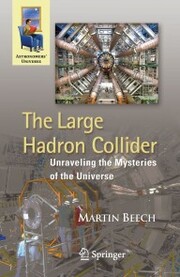Detailansicht
The Large Hadron Collider
eBook - Unraveling the Mysteries of the Universe
ISBN/EAN: 9781441956682
Umbreit-Nr.: 1830811
Sprache:
Englisch
Umfang: 218 S., 12.51 MB
Format in cm:
Einband:
Keine Angabe
Erschienen am 29.07.2010
Auflage: 1/2010
E-Book
Format: PDF
DRM: Digitales Wasserzeichen
€ 41,95
(inklusive MwSt.)
Sofort Lieferbar
- Zusatztext
- It may at first seem that the world of subatomic physics is far removed from our every day lives. Isnt it all just a waste of time and taxpayers' money? Hopefully, all who read this book will come to a different conclusion. Collider physics is all about our origins, and this aspect alone makes it worthy of our very best attention. The experiments conducted within the vast collider chambers are at the forefront of humanitys quest to unweave the great tapestry that is the universe. Everything is connected. Within the macrocosm is the microcosm. By knowing how matter is structured, how atoms and elementary particles interact, and what forces control the interactions between the particles, we discover further clues as to why the universe is the way it is, and we uncover glimpses of how everything came into being.The Large Hadron Collider (LHC), in the process of coming online at CERN, is the worlds largest and most complex machine. It represents the pinnacle of human ingenuity, and its physical characteristics, costs, and workings astound us at every turn.We are literally humbled by the machine that has been produced through a grand international collaboration of scientists. This book is about what those scientists hope to discover with the LHC, for hopes do run high, and there is much at stake. Careers, reputations and prestigious science prizes will be realized, and possibly lost, in the wake of the results that the LHC will produce. And there are risks, real and imagined. The LHC will probe the very fabric of matter and it will help us understand the very weft and the weave of the universe.
- Kurztext
- This book of popular science explains what the Large Hadron Collider is, how it works, and what it hopes to discover. It discusses possible risks and dangers with the LHC and relates theoretical physics of the very largest and very smallest scales.
- Autorenportrait
- Dr. Martin Beech is a full professor of astronomy at Campion College at The University of Regina in Saskatchewan, Canada. He has published many scientific research papers on stellar structure and evolution and several books on astronomy. Asteroid 12343 has been named in recognition of his research on meteors and meteorites. This is Beechs third book for Springer. He has already published Rejuvenating the Sun and Avoiding Other Global Catastrophes (2008) and Terraforming: The Creating of Habitable Worlds (2009).
